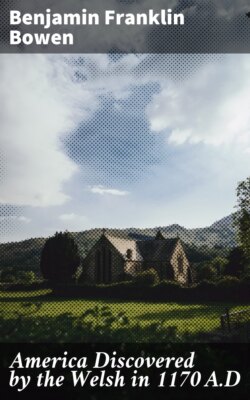Читать книгу America Discovered by the Welsh in 1170 A.D - Benjamin Franklin Bowen - Страница 3
На сайте Литреса книга снята с продажи.
PREFACE.
ОглавлениеTable of Contents
Some time since, J. Sabin, the well-known book antiquarian of New York, related a very amusing story to me of a clergyman from Rhode Island coming into his store and inquiring whether he wished to purchase an Indian Bible. At once Mr. Sabin replied that he did, and that he would pay him five hundred dollars for it. The clergyman was delighted, returned to his home in Rhode Island, and, fearing to intrust so costly a relic to the express, determined to carry it himself to the city. With great eagerness he opened the book in Mr. Sabin's presence, when the latter, equally surprised and amused, exclaimed—
"Why, sir, that's not an Indian Bible!"
"Not an Indian Bible!"
"Why, no, sir!"
The clergyman at first thought the antiquarian was quizzing him, but, seeing him so serious, asked—
"Well, Mr. Sabin, what makes you think so?"
"Because it is a Welsh Bible."
The clergyman hastily picked up the volume and disappeared.
The two languages bear a marked resemblance to each other. In the classification of the letters, the consonants in particular, including the gutturals, palatals, dentals, and labials, with their forms and mutations, hold such an identity in sound that any person not familiar with either language might take them to be the same, while he who understood both would as readily allow that in many respects they were akin.
The following pages are the result of an earnest desire to settle the question of, and, if possible, to fix the belief in, the voyages of Prince Madoc and his followers in 1170 A.D., and to assign them their rightful place in American history. Although this recognition has been very tardily given, by the almost utter silence of our historians, and the apparent unconcern of those linked with the Prince by blood, language, and country, the honor will be none the less real if bestowed now. Indeed, in this age of claims, and when every scrap of our general and local history is eagerly sought and read, it cannot be otherwise than that what is set forth in his favor will receive some share of attention from an intelligent public. Besides, so much earnest study has been given by those in other countries to the subject of the early discoveries on the American Continent, that it is hoped this contribution to its literature will serve to foster still further the spirit of inquiry, and be at the same time an acknowledgment of our debt to those countries for what they have furnished us in brain, heart, muscle, and life.
At intervals extending through several years, when released from the pressure of my public work, I have been engaged in the collection of the materials, both at home and abroad, from old manuscripts, books, pamphlets, magazines, and papers. The subject was not common, neither were the materials. What are the facts? That is the question. Facts of history, experience, observation. Speculative verbiage is avoided, for want of time and space. Others are made to take my place, for the sake of presenting what they knew. Such a method is more convincing than the expression of empty opinions.
B. F. B.
| CHAPTER I. | |
| PAGE | |
| The Migrations of the Welsh | 9 |
| CHAPTER II. | |
| By whom was America first peopled? | 17 |
| CHAPTER III. | |
| The Voyages of Prince Madoc | 25 |
| CHAPTER IV. | |
| Supported by Welsh and other Historians | 34 |
| CHAPTER V. | |
| The Narrative of Rev. Morgan Jones | 47 |
| CHAPTER VI. | |
| The Narrative of Rev. Charles Beatty | 59 |
| CHAPTER VII. | |
| The Welsh Indians moving West | 71 |
| CHAPTER VIII. | |
| The Dispersion of the Welsh Indians | 85 |
| CHAPTER IX. | |
| Maurice Griffith's and his Companions' Experience | 96 |
| CHAPTER X. | |
| Captain Isaac Stuart, Governors Sevier and Dinwiddie, General Morgan Lewis—their Knowledge of the Welsh Indians | 109 |
| CHAPTER XI. | |
| The Mandan Indians: Who are They? | 120 |
| CHAPTER XII. | |
| Welsh Blood in the Aztecs | 130 |
| CHAPTER XIII. | |
| The Moquis, Mohaves, and Modocs | 145 |
| CHAPTER XIV. | |
| Signs of Freemasonry among Indians | 156 |
| CHAPTER XV. | |
| The Welsh Language among American Indians | 159 |
| CHAPTER XVI. | |
| The Welsh of the American Revolution | 165 |
| CHAPTER XVII. | |
| Address of Rev. David Jones at Ticonderoga | 180 |
AMERICA DISCOVERED
BY
THE WELSH.
